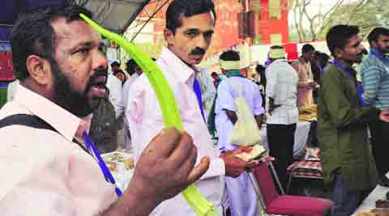Stay updated with the latest - Click here to follow us on Instagram
Mango seed from Tipu’s era, rice variety that controls blood pressure
Some farmers have with them varieties of paddy seeds that they say are salt-tolerant, drought-tolerant and flood-tolerant.

By Amelie Caralp
A variety of mango seed dating back to the time of Tipu Sultan, rice variety that is said to help control blood pressure, and varieties of seeds of foodgrains more than a century old — these are on display at the 5th National Organic Farming Convention that started Saturday.
The three-day event is being held at National Institute of Technical Teachers Training and Research (NITTTR) and Chandigarh College of Engineering and Technology, Sector 26. A few varieties of seeds for vegetables are also on sale.
monthly limit of free stories.
with an Express account.
Some farmers have with them varieties of paddy seeds that they say are salt-tolerant, drought-tolerant and flood-tolerant.
Black rice and red rice are the other kinds of paddy available.
Mahesh, a farmer from Chhattisgarh, has preserved 425 indigenous varieties of paddy. There are some varieties, he says, can control blood pressure.
Most of the varieties date back 100 to 150 years, he adds.
“We grow the varieties on 150 to 200 acres of land. If these are not sown, the seeds will get destroyed. We also distribute the seeds of different varieties in the villages. The other farmers are encouraged to distribute these further. This way the indigenous varieties would be preserved,” says Mahesh.
One of the traditional practices in agriculture was exchange of seeds between farmers. As hybrids started being used, seeds had to be purchased from companies. Some farmers are now reverting to the old practice of preserving indigenous seeds and distributing these among fellow farmers.
The seed savers network of India has to its credit preservation of hundreds of varieties of paddy, wheat, kidney beans, etc.
Dr Usha, who is associated with an organisation, Thanal, that is involved with preservation of indigenous seed varieties, says that in India traditionally around one lakh varieties of paddy were available. However, now the numbers are just a few thousand. She says there are varieties of paddy that are beneficial for expectant mothers, others for children.
Jaiprakash Singh, a farmer from Benaras who has studied till Class 9 and has developed 140 varieties of wheat, says: “I have been working in the field since 1990. Some of the wheat varieties I have developed contain 12 per cent iron. I am distributing these free of cost to the farmers. These do not require chemical fertilisers and some even require less water,” he says.
A Kerala stall stands out
Among all the stalls with varieties of rice, wheat and medical seeds, George Anthony’s stall stands out. It has on display air potatoes, daily bingal and elephant tusk lady’s finger — grown organically on Anthony’s Vakkachan Organic Seed Farm of Kerala. The names signify the way these common vegetables are grown. Air potato, instead of growing underground, grows on climbers, while the daily bingal can be plucked every day as it grows daily. The spectacular looking elephant tusk lady finger is named thus due to its impressive size.